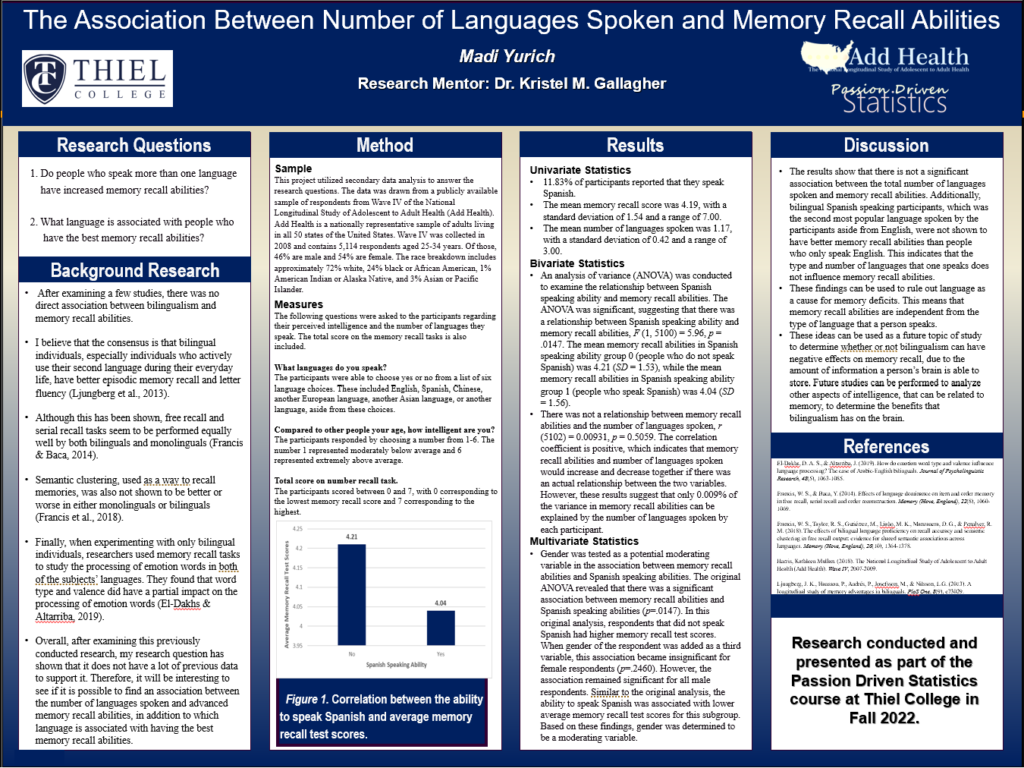Issue 3 (Fall 2023)
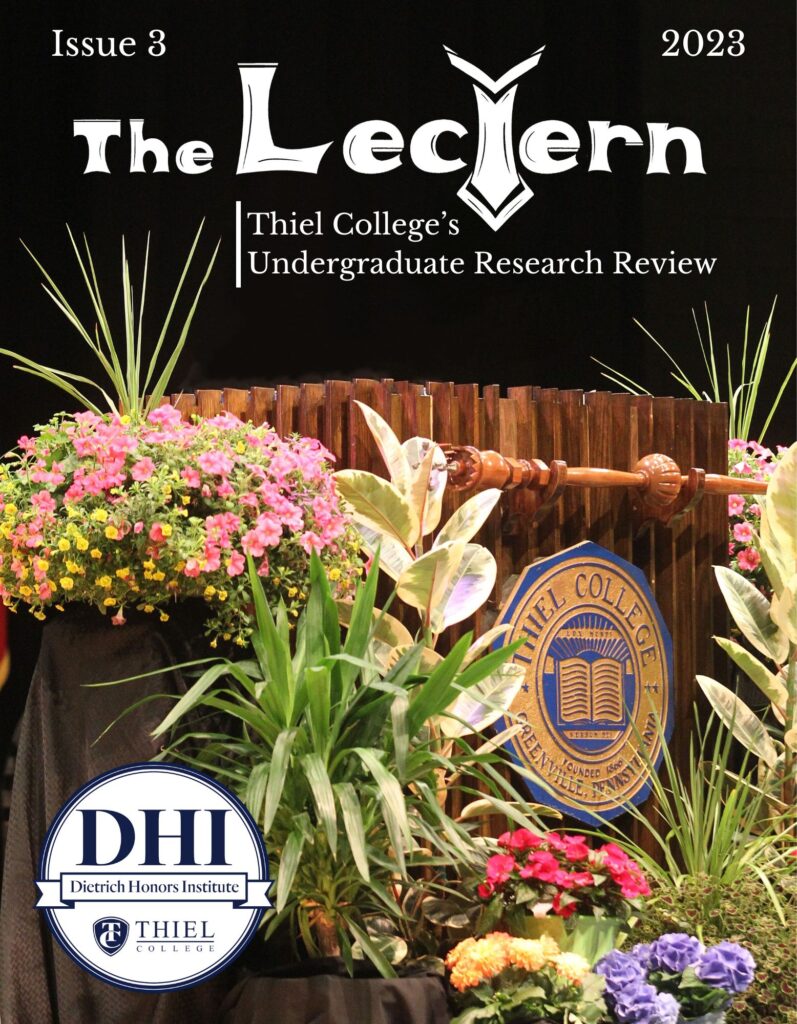
Editors-in-Chief
C. Grace Honeycutt and Emily Irons
Editorial Board
Savannah Adams, Matt Beuermann, Roxanne Cianci, Makenna Oswalt, Taylor Pearce, Samantha Reid, Devin Rhoads, Colin Schroyer, and Madeleine White
Faculty Advisor
Dr. Sheila Gross, Assistant Professor of English
Dietrich Honors Institute Director: Dr. Sheila Nowinski, Associate Professor of History
Issue 3 Journal Articles
The Devil isn’t Always an Ass: Milton’s Revival of Satan in the Seventeenth Century
By Matt Beuermann
Wilderness is Everywhere: The Importance of Community to American Environmentalism
By Roxanne Cianci
Edgar Allen Poe and H.P. Lovecraft: The Language of Madmen
By Alexander Henry
That’s Nobody’s Business but the Turks…Or is it?: An Examination of Jacobean Drama as a Tool to Promote English Imperialism
By Janelle Mudry
We are Not Ready: A Look at the Current State of Renewable Energy
By Colin Schroyer
Dvorak’s Setbacks: Barriers to Learning the Dvorak Keyboard
By Zakaria Wilson
Keep Talking and Nobody Explodes: The Effect of Non-Verbal Cues on Collaboration
By Zakaria Wilson
Students, and Brand Names, and Condoms, Oh My!
By Michaela Brown
Issue 3 Research Posters
Students, and Brand Names, and Condoms, Oh My!
By Michela Brown
Abstract
Throughout the years, Thiel College students have expressed their distrust of less recognizable, or generic, brands of condoms. In line with this, research shows that consumers show a preference for name brand products over generic ones. The purpose of this study was to see if college students preferred name brand condoms over generic brand; I hypothesized that there would be a strong preference for name brand condoms. To test my hypothesis, free supplies of condoms were placed on six dorm floors; three floors were randomly assigned to be given name brand condoms and the remaining three floors were given generic brand condoms. At the end of each day, the number of condoms taken were recorded and the supplies were restocked. In addition, a survey was sent out to the student body that asked about the recognizability of brands of condoms, how likely students were to use them, and whether they preferred name brand over generic brand condoms. The results showed a significant difference between the number of name brand condoms taken compared to generic brand condoms. Students showed a strong preference for name brand condoms, and the survey data supported these results. Future studies should research whether providing name brand condoms increases the amount of safe sex students are practicing.
Michaela Brown ’23 graduated with a BS in Psychology and is from Martinsburg, PA
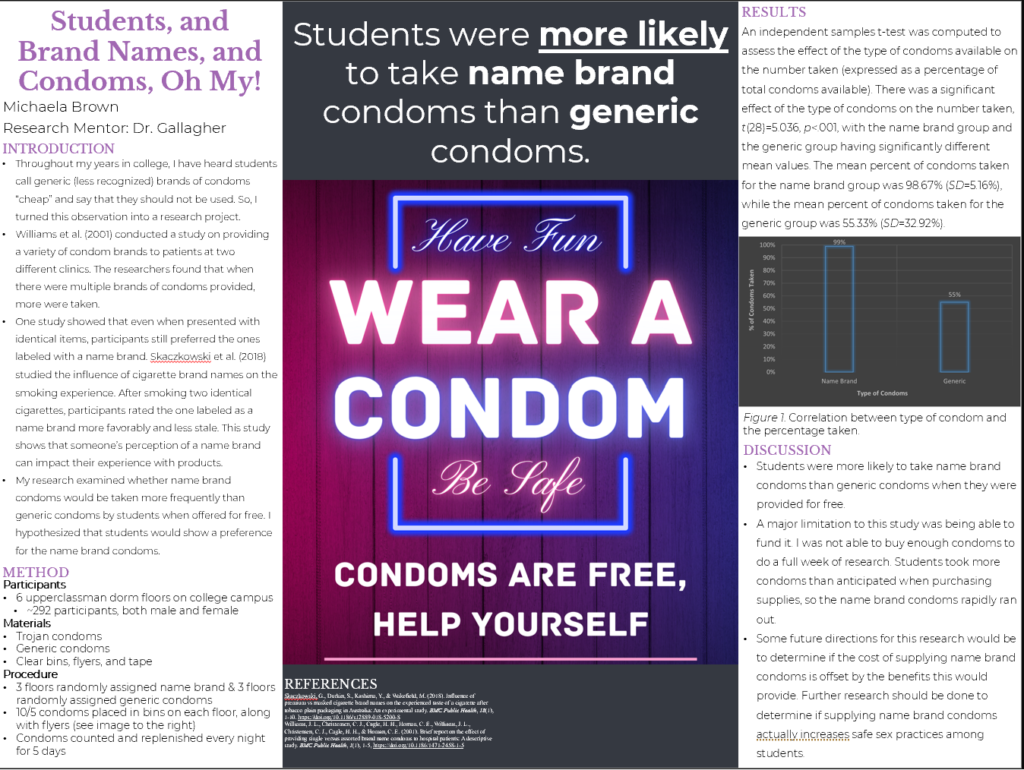
The Association Between Parent-Child Relationships and Multilingualism in Adults in the United States
By Laci Dezern
Abstract
This research focused on the association between multilingualism and parent-child relationships. Research was also done to determine if there was a correlation between parents with domineering personality traits and multilingualism attained and used across the lifespan. The sample for this study was drawn from Wave IV of the National Longitudinal Study of Adolescent to Adult Health dataset. There was a total of 5,114 respondents aged from 25-34 within the sample. The study revealed that there was a definite relationship between knowing more than one language and having a strained parent-child relationship. There is a possible correlation between domineering personality traits and multilingualism. Males and females also had different, significant results. It was found that females who are multilingual are more likely to become upset and angry, which could highlight further research regarding possible stress factors that lead to multilingual females to express negative emotions, especially those with children.
Laci Dezern ’25 is a Psychology and Philosophy major from Pittsburgh, PA.
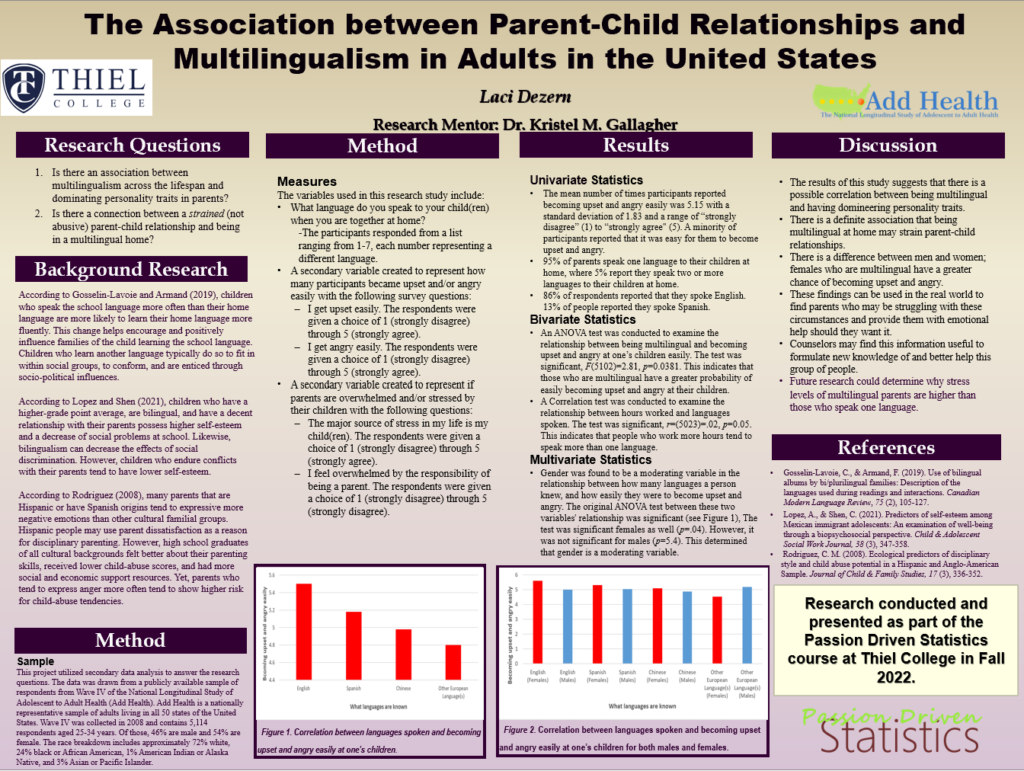
The Association Between Prolonged Passive Screen Time and Mild Cognitive Impairment in Adults
By Paige Long
Abstract
The purpose of this study was to examine the relationship between prolonged passive screen time and mild cognitive impairment (MCI). Passive screen time (PST) is defined as the engagement in sedentary screen activity, wherein the participant is passively receiving screen-based information. Operationally, it can be defined as watching television and/or mindlessly scrolling through social media. Mild cognitive impairment (MCI) is defined as an early stage of memory loss in individuals who maintain the ability to perform daily life tasks independently. More recently, it has been referred to as “Digital Dementia;” a term coined by Manfred Spitzer to amplify the association between the excessive use of digital devices and cognitive impairments associated with dementia.
The sample was obtained through Wave IV of the Adolescent to Adult Health (ADD Health) Data Set. In total, there were 5,114 respondents aged 25-34. Of the respondents, 2,353 identified as male and 2,761 identified as female, with varying racial identities. Responses were measured using a self-report questionnaire method. Data was analyzed using an Analysis of Variance (ANOVA); which revealed that there is an association between prolonged passive screen time and mild cognitive impairment in adults. Interestingly, contrary to the data trend present in earlier bodies of research, the results of this study show that higher rates of passive screen time contribute to an increase in true-word recall and memory. However, results also show that higher rates of passive screen time contribute to an increase in false-word recall and memory, highlighting the potential detrimental impact of passive screen time on cognitive capacity. Further research must be conducted to further investigate the relationship between prolonged passive screen time and mild cognitive impairment in adults. Best practice to improve this study could include implementing a cohort-sequential design following a set of age cohorts from 12-18 and measuring their cognitive outcomes annually.
Paige Long ’24 is a Cognitive and Developmental Psychology and Neuroscience major from Huntingdon, PA.
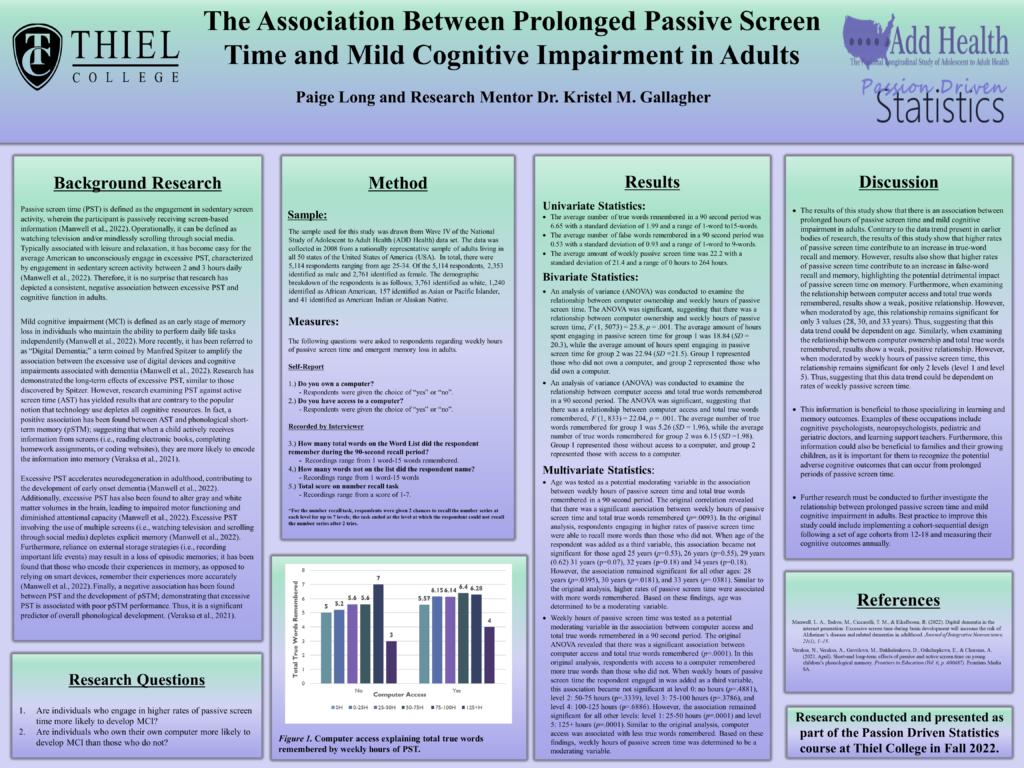
The Correlation Between Childhood Sexual Abuse and Boarderline Personality Traits in Adulthood
By Gena Miller
Abstract
With the historically noted relationship between any kind of childhood trauma and the development of mental illness later in life kept in mind, this study aims to further illuminate any possible association between one’s experience with childhood sexual assault (CSA) and their expression of that experience later in life through poor coping methods and manifestations in the personality, namely traits of borderline personality disorder (BPD). The data utilized in this study was sourced from Wave IV of the National Longitudinal Study of Adolescent to Adult Health (Add Health), collected in 2008 and with 5,114 respondents, of which 46% of respondents were male and 54% female. This study demonstrates a correlation between the frequency of CSA in an individual and their subsequent suicidality, as well as traits aligning with BPD (gauged with measures such as self-assessed mood and sense of control, among others), signifying that the presence of CSA in an individual’s life is a statistically significant predictor for struggles with suicidality later on, as well as traits aligning with BPD and the severity of the individual’s prognosis. With more substantiated findings from more thorough longitudinal studies on the subject in the future, this information could be beneficial to improving the clinical treatment of those with BPD and related issues.
Gena Miller ’25 is a Neuroscience major from Greenville, PA.
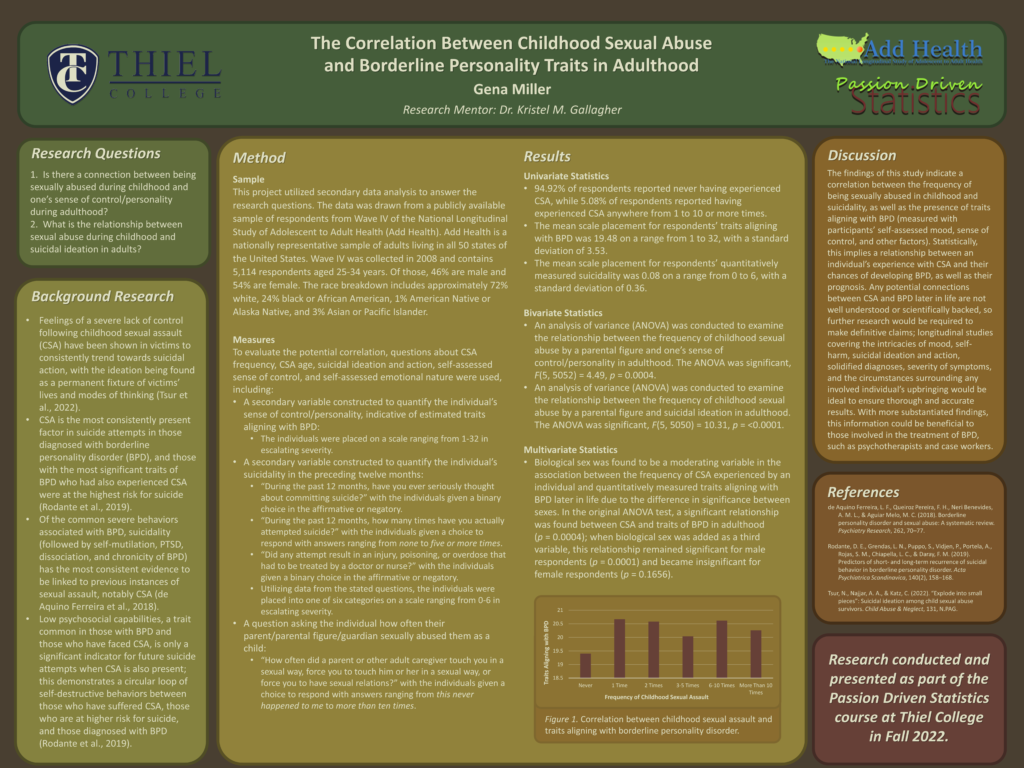
The Association Between Number of Languages Spoken and Memory Recall Abilities
By Madi Yurich
Abstract
The purpose of this study was to determine whether there is an association between the number of languages a person speaks and their memory recall abilities. Many would infer that memory is an important factor in being able to speak multiple languages, and therefore those who speak more than one language should score higher on memory recall tests than those who
only speak one language, but this study proved the opposite to be true. This relationship was analyzed based on a publicly drawn sample of respondents from Wave IV of the National Longitudinal Study of Adolescent to Adult Health (Add Health). Add Health is a nationally representative sample of adults living in all 50 states of the United States. Wave IV was collected in 2008 and contains 5,114 respondents aged 25-34 years. The study revealed that there is not an association between the number of languages spoken and memory recall abilities, in fact memory recall test scores were lower in bilingual individuals compared to monolingual individuals. Although the results of this study were significant in that they showed that there was not an association, it is interesting to note that isolating gender as a third variable made the results insignificant for bilingual female participants. This means that the lack of an association between languages spoken and memory recall abilities did not apply for female participants. Overall, these findings can be used to rule out language as a cause for memory deficits, which means that memory recall abilities are independent from the type and number of languages that a person speaks.
Madi Yurich ’24 is a Communication Sciences and Disorders and Neuroscience major from Harmony, PA.
